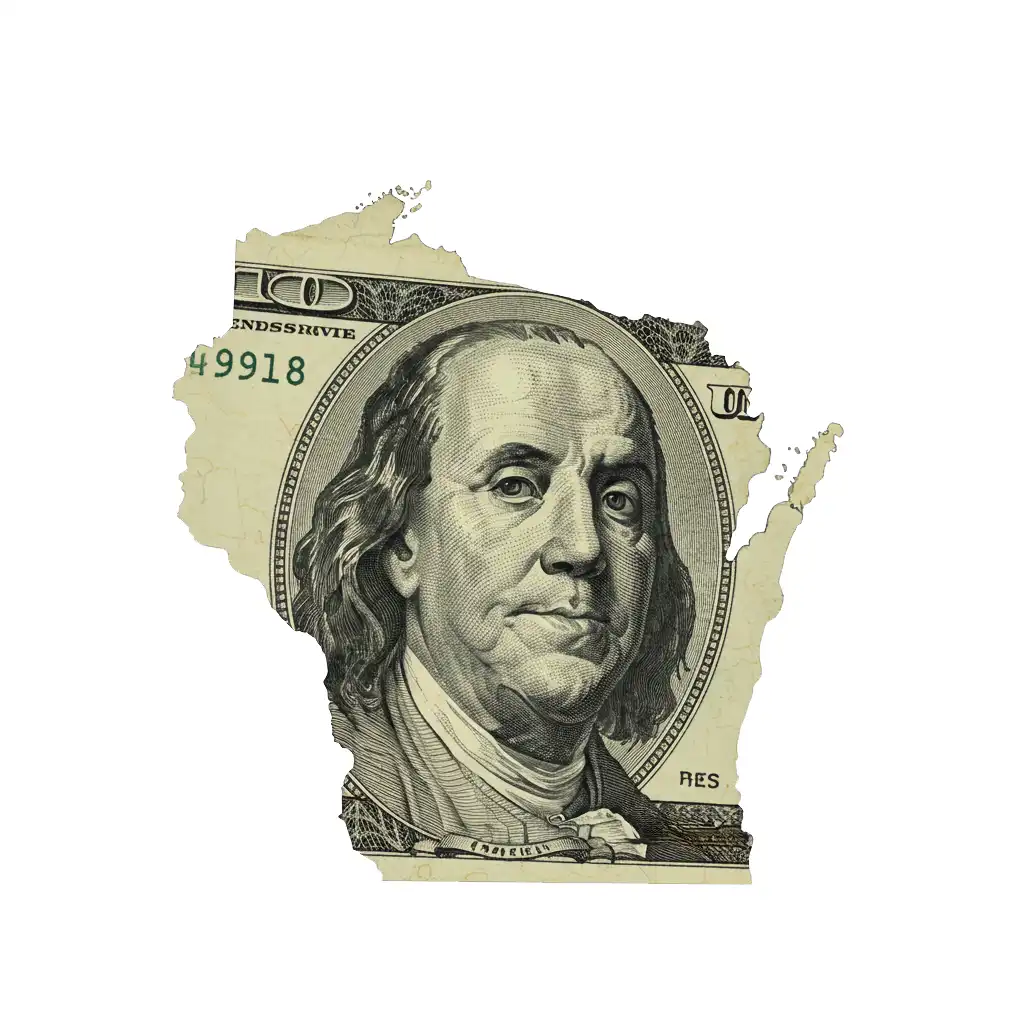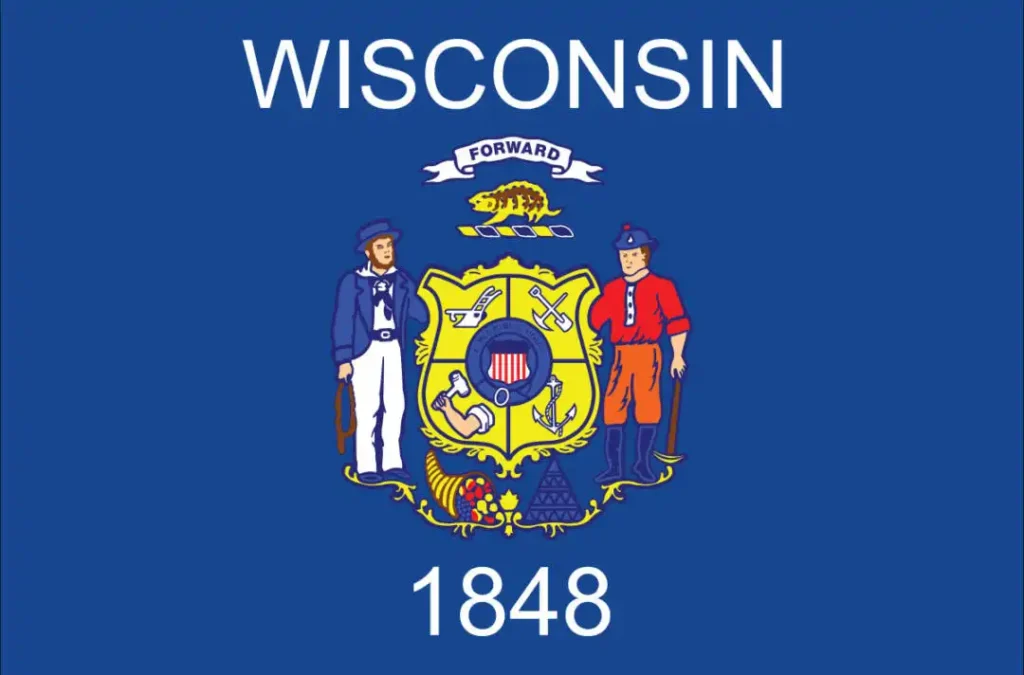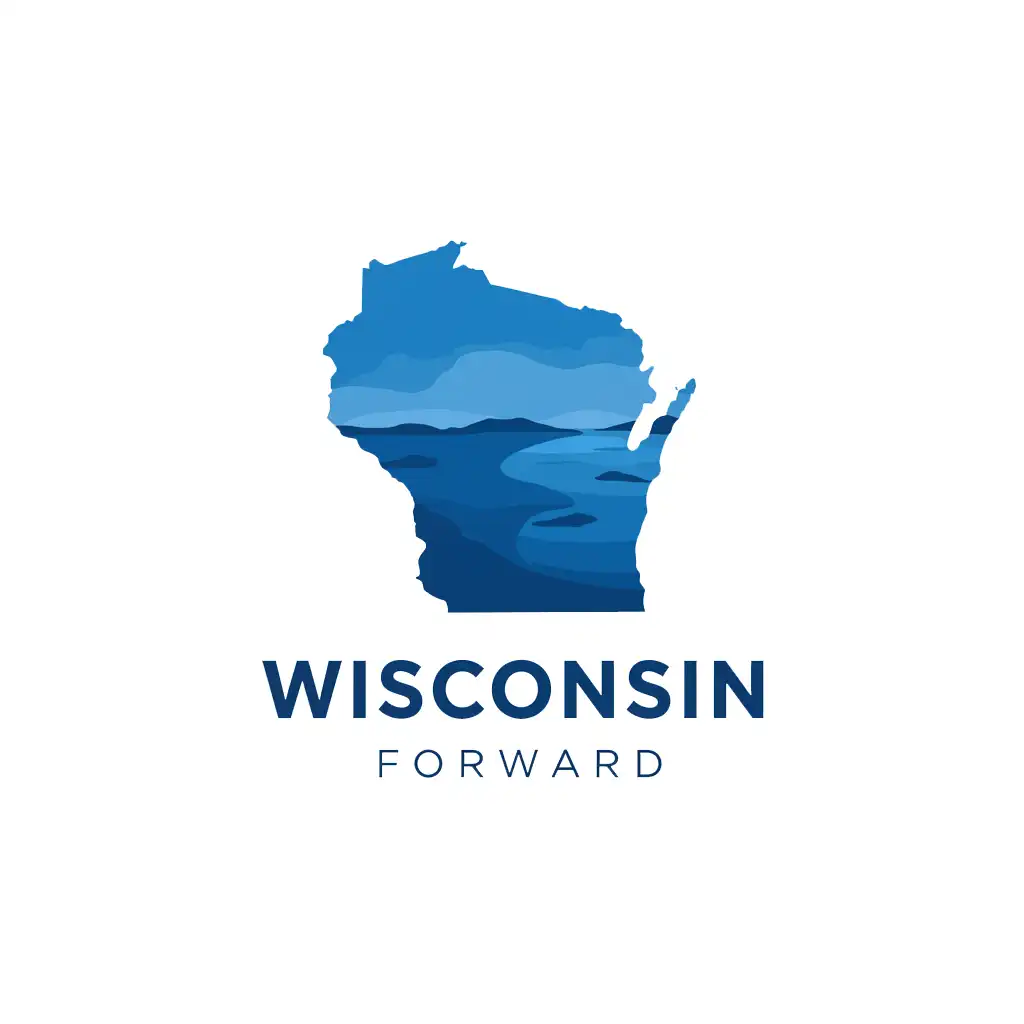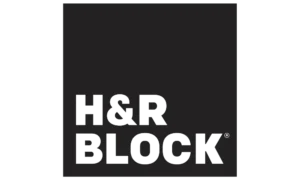Free Wisconsin Sales Tax Calculator
Wisconsin Sales Tax Calculator
Found our Free Wisconsin Sales Tax Calculator useful? Bookmark and share it.

How to Use the Wisconsin Sales Tax Calculator
Our Wisconsin Sales Tax Calculator is designed to be user-friendly and provide you with accurate sales tax calculations quickly. Here’s a step-by-step guide on how to use it:
1. Enter the Sale Amount:
- In the “Sale Amount ($):” field, enter the total amount of the sale before taxes.
- Use numbers and decimals (e.g., 100.00, 25.50).
- Ensure you enter a valid numerical value.
2. Select Your Location (Choose One Method):
- Method 1: Select by ZIP Code:
- Click on the “Select ZIP Code:” dropdown menu.
- Scroll through the list or begin typing your ZIP code to find it quickly.
- Select the appropriate ZIP code from the list.
- Method 2: Select by Tax Region:
- If you don’t know the ZIP code, you can select the tax region.
- Click on the “Or Select Tax Region:” dropdown menu.
- Scroll through the list, and select the region you are looking for.
- Important: You must select either a ZIP code or a tax region. Selecting both will not work.
3. Include Special Rates (Optional):
- If you need to include any special local tax rates, check the box labeled “Include Special Rate.”
- If you are unsure if a special rate applies, leave the box unchecked.
- Keep in mind that some locations in Wisconsin have special rates, such as the tourist areas of Lake Delton, and Wisconsin Dells, and the city of Milwaukee.
4. Calculate the Sales Tax:
- Click the “Calculate Sales Tax” button.
- The calculated sales tax amount will be displayed in the “Result” section below the button.
- The result will also show the effective combined tax rate.
5. Review the Results:
- The “Result” section will display the calculated sales tax amount in dollars and cents (e.g., $5.50).
- It will also display the effective tax rate that was used to create the calculation.
- Double-check the results to ensure they meet your needs.
Tips for Accuracy:
- Always enter the sale amount accurately.
- Select the correct ZIP code or tax region to ensure the correct tax rate is applied.
- If you are unsure about special tax rates, consult the Wisconsin Department of Revenue or a tax professional.
- If you change the ZIP code, Tax region, or the include special rate checkbox, be sure to press the calculate button again.
Understanding Wisconsin Sales and Use Tax
In Wisconsin, like most states, sales tax is a fundamental part of the revenue system. It’s a flat-rate tax applied to the purchase price of goods and services at the retail level. This tax is collected by retailers and then remitted to the Wisconsin Department of Revenue.
- Sales Tax:
- A tax imposed on the purchase of goods and services at the point of sale.
- Collected by retailers and paid to the state.
- Retailers must obtain a seller’s permit and maintain accurate sales records.
- Use Tax:
- A tax imposed on consumers who purchase goods or services outside of Wisconsin for use within the state.
- It prevents consumers from avoiding Wisconsin sales tax by buying items in locations with lower or no sales tax.
- Generally, credits are given for sales tax already paid in other states to avoid double taxation.
- Use tax is also applicable when a seller purchases goods for resale, and then uses those goods for a taxable purpose.
Wisconsin's Sales and Use Tax Rates
- The state sales and use tax rate in Wisconsin is 5%.
- Counties may also impose an additional local sales and use tax of up to 0.5%.
- Certain areas may have additional taxes, such as “room” taxes for lodging and stadium district taxes.
Historical Development of Sales Taxation in the U.S.
- U.S. state sales taxes evolved from occupation taxes on businesses in the late 19th and early 20th centuries.
- Mississippi enacted the first state retail sales tax in 1932, which replaced a broad business occupation tax.
- The retail sales tax became popular due to its administrative simplicity and revenue generation, especially during the Great Depression.
- By 1969, 45 states, including Wisconsin (in 1962), had implemented sales taxes.
- Currently, five states do not have a state sales tax: Alaska, Delaware, Montana, New Hampshire, and Oregon. However, Alaska and Montana do have local sales taxes.
- The streamlined sales tax project, and agreement, were created to simplify and modernize sales and use tax administration. Wisconsin joined this agreement in 2009.
The Nature of Sales Taxation
- Most states use a single-stage retail sales tax on gross receipts from the sale of personal property.
- States may use general sales taxes with exemptions or selective taxes on specific products or services.
- Retail sales are typically those made to consumers, but can include certain business purchases.
- Sales tax structures are evaluated based on efficiency, equity, administration, and compliance.
Regressivity of the Sales Tax
- Sales taxes are often considered regressive, as lower-income individuals spend a larger proportion of their income on taxable goods.
- Exemptions for essential items like food and drugs can mitigate this regressivity.
- Studies on the regressivity of sales taxes have produced varying results, depending on the factors considered, such as lifetime income versus annual income.
- The burden of sales tax can fall on consumers or businesses, which impacts its regressivity.
Exemptions from the Sales Tax Base
- Exemptions can narrow the tax base but can also reduce regressivity.
- Common exemptions include food for home consumption and prescription drugs.
- Exempting services can also reduce regressivity, as spending on services tends to increase with income.
- Exemptions can complicate tax administration and compliance.
- Some states use income tax credits to offset sales taxes paid, particularly for essential items.
Temporary Tax Holidays and Rebates
- Sales Tax Holidays:
- Periods when sales tax is temporarily suspended on certain goods.
- Used to stimulate the economy and provide targeted tax relief.
- Can shift the timing of purchases rather than generate new sales.
- May benefit higher-income consumers who can time their purchases.
- Can complicate retailers’ accounting and collection methods.
- Sales Tax Rebates:
- Refunds for sales taxes already paid.
- Used to return revenue surpluses to taxpayers.
- Can be targeted to specific groups, such as low-income families.
- Require a delivery mechanism and a method to determine rebate amounts.


What is Taxable in Wisconsin?
Wisconsin’s sales and use tax applies to a wide range of products and services. Here’s a breakdown of what’s generally considered taxable:
Taxable Products (Tangible Personal Property, Items, Property, and Goods)
- Tangible Personal Property:
- This includes items you can physically touch, such as clothing, furniture, electronics, and vehicles.
- Also includes utilities like electricity, gas, steam, and water.
- Prewritten computer software, regardless of delivery method.
- Collector’s Coins or Stamps:
- U.S. coins or stamps sold above their face value as collector’s items.
- Leased Tangible Personal Property:
- Property leased and affixed to real estate, if the lessor can remove it upon lease termination (unless the lessor also owns the real estate).
- Digital Goods:
- Electronically transferred digital goods, including:
- “Specified digital goods”: digital audio works, digital audiovisual works, and digital books.
- “Additional digital goods”: greeting cards, finished artwork, periodicals, video or electronic games, and newspapers or other news or information products.
- Electronically transferred digital goods, including:
Taxable Services
- Admissions and Access Privileges:
- Admissions to events (movies, concerts, sports games, etc.).
- Access to recreational facilities (gyms, clubs, etc.).
- Entry fees for events.
- Amusement Devices:
- Access to jukeboxes, pinball machines, arcades, and mechanical rides.
- Cable Television:
- Cable TV services, including installation.
- Landscaping and Lawn Maintenance:
- Services like planting, mowing, spraying, and tree services.
- Laundry and Dry Cleaning:
- Laundry, dry cleaning, pressing, and linen rentals.
- Parking and Docking:
- Parking for vehicles and aircraft.
- Docking and storage for boats.
- Photographic Services:
- Photography, film processing, and videography.
- Producing, Fabricating, and Printing:
- Manufacturing or printing taxable products for consumers.
- Repair and Service of Taxable Products:
- Repairs, maintenance, and alterations of taxable goods.
- Contracts for Future Performance of Services:
- Service contracts, maintenance agreements, and warranties for taxable products.
- Rooms and Lodging (Less Than One Month):
- Hotel, motel, and similar lodging for stays under one month.
- Internet Access, Prepaid Calling, Telecommunications, and Ancillary Services:
- Telecommunications services, including intrastate, interstate, and international calls.
- Ancillary services like call forwarding and caller ID.
- Prepaid calling services.
- Telecommunications Message Services:
- Recording and transmitting telecommunications messages (e.g., answering services, voicemail).
- Towing and Hauling of Motor Vehicles:
- Towing services by tow trucks.
- Delivery Charges:
- Delivery charges for taxable products or services.
Bundled Transactions
- The retail sale of two or more distinct and identifiable products or services for one nonitemized price.
- Generally the entire bundled transaction is taxable, with some exceptions.
Property May Only Be Taxed Once
- A product can only be taxed once, even if it falls under multiple taxable categories.
Wisconsin Sales and Use Tax Exemptions
Wisconsin law provides numerous exemptions from sales and use tax, designed to avoid taxing certain essential goods, promote specific industries, or prevent double taxation. These exemptions can be broadly categorized based on whether an exemption certificate is required and the nature of the exempt entity or transaction.
General Exemption Principles
- Retail sales of taxable products and services are subject to tax unless a specific exemption applies.
- Exemptions can be based on:
- The nature of the product or service itself.
- The intended use of the product or service.
- The status of the buyer or seller.
- Generally, an exemption certificate is required to claim an exemption, but some exemptions are automatic.
Exemptions That Do Not Require Exemption Certificates
These are automatically exempt, though the purchaser remains liable for use tax if the item is used in a non-exempt manner. Some examples include:
- Certain aircraft parts and repair services.
- Caskets and burial vaults.
- Prescription drugs and certain medical equipment.
- Most food and food ingredients (but not candy, soft drinks, dietary supplements, or prepared food).
- Fuel and electricity for residential or farming use.
- Printed publications like newspapers and periodicals.
- United States and Wisconsin state flags.
- Sales by the United States government.
Exemptions That Require Exemption Certificates
Sellers must obtain a completed exemption certificate from the purchaser to claim these exemptions. Examples include:
- Advertising and promotional direct mail.
- Sales to affiliated businesses.
- Sales to common or contract carriers.
- Catalogs and their mailing envelopes.
- Farm equipment and supplies.
- Manufacturing machinery, equipment, and materials.
- Sales for resale.
- Sales to nonprofit organizations with a Certificate of Exempt Status (CES) number.
- Sales to Wisconsin governmental units.
Exempt Organizations
Certain organizations are exempt from sales and use tax on their purchases:
- Nonprofit organizations with a Certificate of Exempt Status (CES) number.
- Wisconsin governmental units, agencies, and instrumentalities.
- Wisconsin American Indian tribes and bands.
- Public and private elementary and secondary schools.
- The United States government.
- Colleges and Universities.
Disaster Relief Bankcards and Vouchers Issued by Exempt Organizations
Purchases made with funds provided by organizations like FEMA and the American Red Cross may be exempt under certain conditions, depending on the payment method.
Other Exemptions
- Certain transactions involving auto dealers.
- Separately stated charges for insurance, interest, financing, or carrying charges.
- Sales in interstate commerce.
- Sales to nonresidents under specific conditions.
- Certain non-sales transactions, such as corporate reorganizations.
- Donation of certain property to qualifying organizations.
- Certain transactions by operators of distribution facilities.

Other Sales Tax Calculators
Loading calculators based on your location…
Disclaimer: The content provided on this webpage is for informational purposes only and is not intended to be a substitute for professional advice. While we strive to ensure the accuracy and timeliness of the information presented here, the details may change over time or vary in different jurisdictions. Therefore, we do not guarantee the completeness, reliability, or absolute accuracy of this information. The information on this page should not be used as a basis for making legal, financial, or any other key decisions. We strongly advise consulting with a qualified professional or expert in the relevant field for specific advice, guidance, or services. By using this webpage, you acknowledge that the information is offered “as is” and that we are not liable for any errors, omissions, or inaccuracies in the content, nor for any actions taken based on the information provided. We shall not be held liable for any direct, indirect, incidental, consequential, or punitive damages arising out of your access to, use of, or reliance on any content on this page.
Trusted By
Trusted by 3.2M+ Employees: 21 Years of Service Across Startups to Fortune 500 Enterprises
Join our ever-growing community of satisfied customers today and experience the unparalleled benefits of TimeTrex.










Strength In Numbers
Join The Companies Already Benefiting From TimeTrex
Time To Clock-In
Start your 30-day free trial!
Experience the Ultimate Workforce Solution and Revolutionize Your Business Today
- Eliminate Errors
- Simple & Easy To Use
- Real-time Reporting

Saving businesses time and money through better workforce management since 2003.
Copyright © 2025 TimeTrex. All Rights Reserved.
